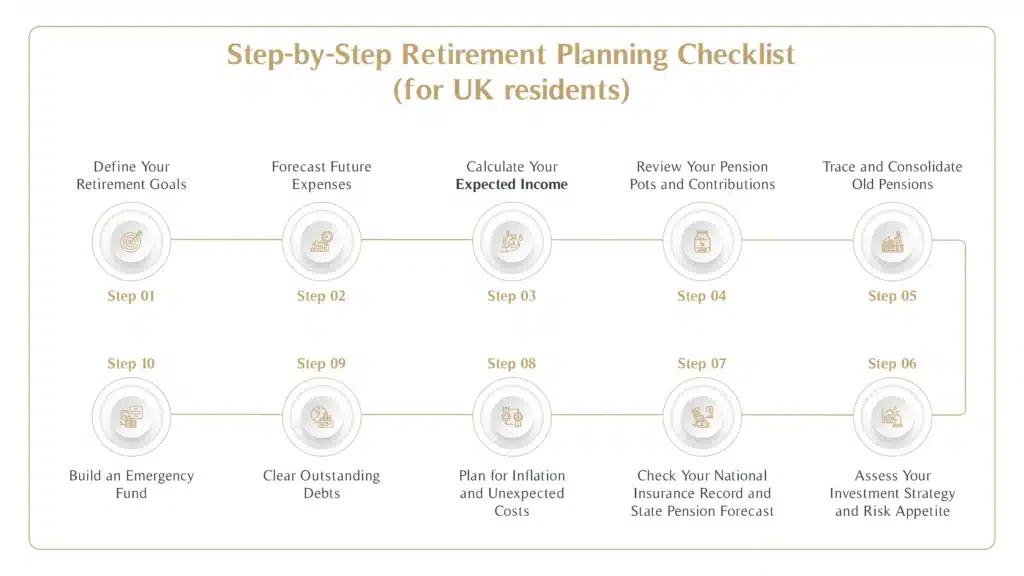As many professionals approach the latter end of their careers, they start to think about retirement. A life not ruled by work, but by your own rules. And the thing is, retiring well doesn’t happen by accident. It happens by design. It’s something you need to lay the groundwork for and prepare before it’s too late.
Whether you’re in your 30s or 60s, a smart, structured approach to retirement planning can make all the difference. Looking ahead and planning can be what separates you from financial freedom and a future of financial uncertainty. Yet, many people across the UK still delay planning, underestimate their needs or simply don’t know where to begin.
This guide offers a step-by-step retirement planning checklist to help you plan proactively and confidently for the years ahead. Whether you’re planning solo or as a couple, use this as your go-to resource to build the retirement you want, need and deserve.
When Should You Start Retirement Planning?
The short answer to this question is… now!
Retirement planning isn’t just for those coming towards the end of their careers. It should be something everyone thinks about, whether you’re just starting out or you’re approaching your 60s. The earlier you start retirement planning, the more options and flexibility you’ll have. But even if you’ve delayed thinking about it, it’s never too late to take control. The best time to start was then, but the next best time to start is definitely now.
Here’s what planning looks like by decade:
- In your 30s: Start building good habits. Join your workplace pension, increase contributions when possible and focus on debt reduction.
- In your 40s: Track your pension pots, increase savings and review your investment strategy. Start forecasting retirement age and lifestyle needs.
- In your 50s: Check your National Insurance record, assess your State Pension forecast and consolidate your pensions. Start thinking about income drawdown strategies.
- In your 60s: Finalise your timeline, assess healthcare needs and plan how to access your pension tax-efficiently.
Step-by-Step Retirement Planning Checklist (for UK residents)
Ready to start planning your retirement? Below, we’ll run through what you need to plan for to make sure nothing is forgotten. Whether you’re just starting or refining an existing strategy, use this checklist for retirement planning to help secure the retirement you dream about.
1. Define Your Retirement Goals
While it might be your biggest driving factor, retirement goes way beyond simply giving up work. Try to think beyond this by asking:
- What age do you want to retire?
- Where do you want to live?
- How do you want to spend your time (travel, hobbies, family)?
- What does comfortable look like to you?
You need clear goals that you can strive towards, which are much more than the vagueness of simply handing in your notice at work. Clear goals guide every decision that follows, so make sure you have a clear idea about what you want to do and by when.
If one of your goals is to become an expat, read our article featuring tips for planning your retirement abroad.
2. Forecast Future Expenses
Life is expensive, and unfortunately, it will continue to be expensive even after you’ve retired, so you need to work out how much your retirement will cost. Think about:
- Housing (mortgage, downsizing, rent)
- Healthcare (NHS, private cover)
- Travel and leisure
- Regular bills and emergencies
Depending on your age, health, lifestyle and a plethora of other factors, your retirement could last for 20 or 30 years. So, you need to plan for that, because you don’t want to be scraping by and having to rely on beans on toast for every meal.
3. Calculate Your Expected Income
Once you retire (and especially when you reach State Pension age), you’ll still receive an income from various sources. Make sure you fully understand where your money will come from so you can manage your finances every month:
- State Pension (check via gov.uk)
- Workplace pensions (defined benefit or defined contribution)
- Personal pensions and SIPP
- ISAs, investments and rental income
Combine your total monthly income and compare it to your projected expenses. This is a great place to start for knowing how comfortable you’ll be during your retirement or if you need to work towards some changes.
4. Review Your Pension Pots and Contributions
Whether you’ve been contributing towards your pension pot for 10 years or several decades, now is the time to check:
- Are you contributing enough to meet your retirement goals?
- Are you making use of employer contributions and tax relief?
- Are you on track to hit your savings target?
Consider using a pension calculator or speaking with a financial adviser for a pension health check.
5. Trace and Consolidate Old Pensions
If you’ve switched employers numerous times over the years, make sure you don’t forget about those old pensions. If you do, you’re literally throwing money away.
Use the UK’s Pension Tracing Service to find lost pensions and consider consolidating them to reduce fees and simplify management.
6. Assess Your Investment Strategy and Risk Appetite
Retirement isn’t the end of investing. In fact, it’s the perfect time to make sure your money continues to work for you during your retirement.
Check:
- Are you too cautious (and missing out on growth)?
- Are you too aggressive for your age or comfort level?
- Do your investments align with your retirement timeline?
Speak to a financial adviser who can help you manage your portfolio and advise you on the most appropriate and valuable investments you can make while you’re retired. Here at MHG Wealth, our retirement planning services can help you stay on top of your portfolio during retirement.
For more information, read our article on investing in retirement.
7. Check Your National Insurance Record and State Pension Forecast
Your State Pension depends on the National Insurance contributions you’ve made throughout your career. To qualify for a new State Pension, you need to have made at least 10 years of payments.
Check:
- How many qualifying years you have
- Whether you can top up for a better pension
- Your forecast amount and State Pension age
Use the official State Pension forecast tool to learn more about how much State Pension you can get.
8. Plan for Inflation and Unexpected Costs
Inflation erodes purchasing power over time, which will impact how much value you have in your portfolio. Make sure your plan factors in:
- Cost of living increases
- Potential healthcare or care home needs
- Large one-off expenses (home repairs, new car, holidays etc.)
9. Clear Outstanding Debts
When you enter retirement, it might not be feasible to ensure all debts are taken care of, but if you can reduce the overall amount of monthly outgoings, it will give you more financial freedom and peace of mind.
Make sure you prioritise:
- High-interest debts (credit cards, personal loans)
- Mortgage (pay off or restructure if needed)
- Limiting the number of credit agreements you sign up for (car leases)
10. Build an Emergency Fund
Aim to keep three to six months’ worth of expenses in cash savings. This helps you avoid dipping into your pension early in the event of something unforeseen (which hopefully won’t be the case if you follow our checklist) or in the event of an emergency.
Fiduciary & Legal Planning Considerations
Retirement isn’t just about savings; it’s about protecting your interests and preparing for every eventuality:
- Assign a Power of Attorney: Ensure someone can manage your affairs if needed.
- Create or update your Will: Especially if your assets or family situation has changed.
- Explore Trusts and Inheritance Planning: Especially if you want to protect wealth or reduce Inheritance Tax.
If you’re helping manage retirement plans for others (e.g. elderly parents), understanding fiduciary duties is essential.
Checklist for Couples
Retirement planning for couples involves extra coordination, but it also offers extra opportunities.
- Align retirement ages to sync timelines
- Plan joint income and expenses, including shared pensions or property
- Discuss healthcare preferences, living arrangements, and future support for family
It’s not just about the numbers, but you need to align and coordinate your vision for what a shared vision of your retirement looks like.
Planning Your Retirement Celebration (Bonus)
You’ve worked hard. You’ve earned your retirement, so it’s time to celebrate the next chapter! During your strategising, try to budget for a retirement celebration, so you can mark the end of your working life in style.
Ideas for a memorable send-off:
- Host a themed retirement party with friends and family
- Travel somewhere on your bucket list
- Start a passion project (now’s the time to write that book you’ve always planned)
- Treat yourself to that home extension
Whatever you do, go out with a bang! Just make sure you budget for whatever it is you want to do, as you don’t want a major blowout to impact your retirement savings. This is a very boring and sensible thing to say, but the last thing you want is to blow all your retirement savings too soon.
For the best retirement bash out there, here’s our planning a retirement party checklist to make sure you have everything you need:
- Set the Basics
- Choose the party date & time
- Book the venue or decide on virtual/in-person
- Set a budget
- Plan the Guest List
- List colleagues, friends, family
- Send invitations (digital or print)
- Theme & Decor
- Choose a party theme or colour scheme
- Order decorations, balloons, banners
- Food & Drink
- Arrange catering or DIY food plan
- Stock drinks (alcoholic/non-alcoholic)
- Don’t forget the retirement cake!
- Program & Entertainment
- Prepare a speech or toast
- Plan a photo slideshow or memory reel
- Organise music, games, or entertainment
- Gifts & Keepsakes
- Arrange a group gift or card
- Set up a memory jar or guest book
- Logistics & Final Touches
- Assign someone to take photos/videos
- Confirm clean-up plan or helpers
- Print thank-you cards or messages
Conclusion: The Power of Planning with a Checklist
A well-planned retirement isn’t about luck; it’s about carefully planning and getting good advice from experienced professionals. But mostly, it’s about action.
Using a detailed pre-retirement planning checklist ensures you:
- Don’t miss key milestones
- Make the most of your money
- Enter retirement with confidence and clarity
At MHG Wealth, we help individuals and couples turn retirement uncertainties into a smart, strategic plan so you can enjoy a fulfilling and financially liberating retirement. Ready to take the next step? Explore our retirement planning services today or reach out to our team of expert financial advisers.
FAQs About Retirement Checklists
What is the best age to start retirement planning?
Ideally, in your 30s, but the simple answer is it’s best to start planning as soon as possible. The earlier you start, the more you benefit from compounding.
How much should I save for retirement in the UK?
It depends on your goals, but a general rule is to aim for two-thirds of your final salary as yearly income. Use calculators to forecast accurately.
Do I need a financial adviser for retirement?
While it’s possible to plan independently, an adviser brings experience, objectivity and personalisation, especially when retirement involves multiple pensions, tax issues or cross-border considerations.
Can I combine different pension pots?
Yes, many people consolidate pensions accrued from time at different employers to reduce fees and simplify planning. Just make sure you don’t lose valuable benefits when transferring.
What is a fiduciary retirement checklist?
It’s a list of legal and ethical duties for those managing retirement finances on behalf of someone else. Key areas include recordkeeping, acting in the retiree’s best interest and legal compliance.








